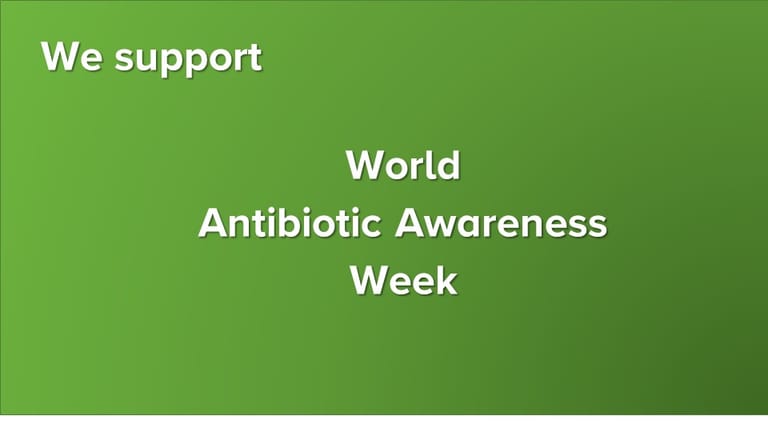
World Antibiotic Awareness Week (WAAW)
Following our mission to contribute to a safe and sustainable agriculture and improve the health of both animals and humans, we have decided to support World Health Organization during, the World Antibiotic Awareness Week, on bringing awareness for concerns with the use of Antibiotic in both Animal and Human Health. Why Antibiotic Awareness is important Antimicrobial drugs, most commonly known as Antibiotics, have been used against microorganisms in both human and livestock helping to successfully control diseases. However, a concern for antibiotic-resistant organisms in Humans as a result of the overuse of these drugs in livestock has been increasing. Especially because the antibiotic treatments can have a direct effect on human health due to bacteria transition from animals. World Antibiotic Awareness Week (WAAW) by World Health Organization (WHO) is meant to remind all of us of the growing concerns and effects of the misuse of these type of drugs. http://www.who.int/campaigns/world-antibiotic-awareness-week/2017/posters/en/ XVET is supporting the Antibiotic Awareness Week because: “Antibiotic resistance is one of the biggest threats to global health, food security, and development today. Antibiotic resistance can affect anyone, of any age, in any country. Antibiotic resistance occurs naturally, but misuse of antibiotics in humans and animals is accelerating the process. A growing number of infections – such as pneumonia, tuberculosis, and gonorrhoea – are becoming harder to treat as the antibiotics used to treat them become less effective. Antibiotic resistance leads to longer hospital stays, higher medical costs, and increased mortality.” In: http://www.who.int/mediacentre/factsheets/antibiotic-resistance/en/ For all the reasons mentioned above, it is important to create awareness for its misusage both in Human and Animal health industries. In general, if the common way of antibiotic usage does not change, antibiotic resistance will remain a major threat. Regarding animal health industry we as XVET take responsibility by promoting our non-antibiotic growth promoters such as Aromax, Orego plus, Turbo Tox, NovoVital, Bacflora F and more. For more information regarding to XVET product range please feel free to contact us on info @ xvetgermany.com . Facts and Trivia about Antibiotic use We will participate in the World Antibiotic Awareness Week by sharing insightful facts and trivia about Antibiotic use and Antibiotic-Resistant Bacteria. Between the 13th and the 19th of November, we will share on our Facebook page the replies to below questions: Why is it important to be responsible when using antibiotics? Proper dosage is not just very important for antibiotic residue in environment but also it is important for antibiotic effectiveness. Responsible use of antibiotics will help reduce the threat of antibiotic resistance. Bacteria are more likely to develop the resistance if the dosage of the antibiotic is not adequate. This is because the bacteria can continue to grow and develop ways to disrupt the antibiotic’s effects. What else can be combined with responsible antibiotic use in Animal Health? Antibiotics are critical health care tool however they must be administered under veterinary oversight. Beside proper usage of antibiotics, it is important to increase the number of beneficial flora to support the immune system and in order to do so, in animal feed, probiotics are the answer. Probiotics are friendly bacteria that can add balance to the intestines which will boost immune system through appropriate diet. Does your body become resistant to antibiotic? “Antibiotics target bacteria, killing or weakening them and helping you to fight off infections. Your body does not develop resistance to antibiotics; it is the bacteria which becomes resistant to antibiotics through genetic changes. This means that if you get an antibiotic-resistant bacterial infection, the usual antibiotics used to fight it will no longer be effective. A less accessible or last resort antibiotic will then need to be used, and in some cases options for potential active antibiotics could run out.” In http://www.who.int/campaigns/world-antibiotic-awareness-week/quiz/en/ How does Antibiotic-Resistant Bacteria spread? “Antibiotics are given to humans, animals, fish and crops. Antibiotic resistance happens when bacteria change and become resistant to the antibiotics used to treat the infections they cause. Antibiotic-resistant bacteria spread through contact with humans, animals, food or environment that are carrying them. You can help to prevent the spread of infections by regularly washing your hands, covering your nose and mouth when you cough or sneeze, and practicing safer sex.” In http://www.who.int/campaigns/world-antibiotic-awareness-week/quiz/en/ What can happen if I get an antibiotic-resistant infection? “Antibiotic resistance is happening everywhere in the world, affecting people of all ages. It is one of the biggest threats to public health today. Antibiotic resistant infections can take longer to treat, may require more frequent doctor visits, possible hospital stays, more severe side effects and expensive treatments. Serious, isn’t it?” http://www.who.int/campaigns/world-antibiotic-awareness-week/quiz/en/ What can we do to prevent antibiotic resistance from spreading? “While antibiotic resistance occurs naturally over time, the misuse and over-use of antibiotics in plants, animals and humans has accelerated this process to dangerously high levels. BUT it’s not too late to reduce the impact of antibiotic resistance and we all have a part to play in preserving the effectiveness of antibiotics. “ http://www.who.int/campaigns/world-antibiotic-awareness-week/quiz/en/ Products such as Aromax, Orego plus, Turbo Tox, NovoVital, Bacflora F and more may help avoid the over-use of antibiotics in animal production. Contact us for more information on info@xvetgermany.com